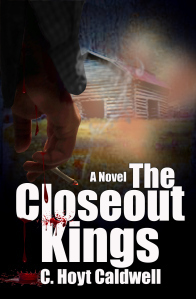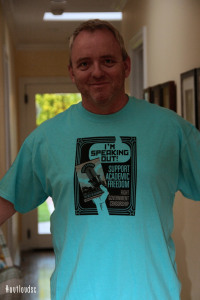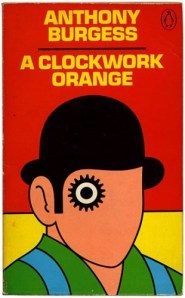R.W. Ridley's Blog, page 13
May 12, 2014
Reggie Watts’ take on teaching literature
May 11, 2014
The Closeout Kings update

Looking for beta readers
The first edit is done for The Closeout Kings. I’ll be looking for beta readers soon. I’ve already got two volunteers, but there’s room for more. Here’s the preliminary one sentence pitch:
When two hitmen for the hillbilly mafia discover they’ve been unwittingly involved in a human trafficking ring in the mountains of Tennessee, they team up with a local deputy and turn their talents on their employers to help find the missing children.
Remember this is a C. Hoyt Caldwell novel. There’s sex, violence and strong language. Backwoods style!
Contact me if you’re interested, here or on Facebook.


#BringBackOurGirls – Wow! George Will won’t even take a break from being an ASS on Mother’s Day!
With almost 300 girls missing in Nigeria, George Will takes the opportunity to criticize Michelle Obama for participating in the Twitter campaign to shine a light on the girls’ plight. He thinks it’s a fruitless exercise because the kidnappers don’t care. It’s not about the kidnappers, you horrible ass! It’s about bringing pressure on the Nigerian government to do something about it! AND IT WORKED! I don’t know who the woman is at the end of this video is, but thank God she gets it.
And seriously – #BringBackOurGirls


May 10, 2014
Why I joined Writers Speaking Out Loud

Bestselling author Dennis Lehane is a member of Writers Speaking Out Loud. Why aren’t you?
This morning I stumbled upon an article in the Charleston City Paper about the Facebook group Writers Speaking Out Loud. It was a fortuitous find given my post yesterday about censorship. Outrage over insensitive material (whether it’s universally insensitive or simply insensitive to a specific belief system) leads even normally rational human beings to make bad decisions. That’s what yesterday’s post was about. As abhorrent as rape and sexism are, to declare a book offensive that contain such elements without the aid of context is an abhorrent response.
To give you an example where such blind indignation can lead, I give you the situation that is currently taking place in my home state of South Carolina. Critical thinking is under siege in our state’s public universities. Now granted, the Palmetto State is not a bedrock of progressive ideas and institutions. We are under the thumb of an extremist political ideology that struggles to extinguish its own gas light dogma and usher in the 21st century. And, that’s the problem. The leaders of this group have inflamed their supporters and bullied politicians into cutting funding to colleges and universities that include what the group deems as offensive material on the educational institutions’ required reading lists. The works they find objectionable are gay and lesbian themed books. Slice it any way you wish, a move to cut funding for presenting ideas that go against your belief system is censorship. It cannot be allowed. That’s what Writers Speaking Out Loud is about. It’s a group of writers across the globe coming together to protest this move to silence and shame those in the gay and lesbian community.
Beyond the gay and lesbian themed material that’s raised the ire of South Carolinians, Clemson University was embroiled in controversy when it invited author Ann Patchett to speak at the university. Parents got wind that freshman at the school were being required to read Patchett’s book Truth & Beauty, and they protested because they considered it so pornographic that no 18-year-old should be forced to read it. Patchett’s response? To put it succinctly, perfect. She accepted the invitation and told the group of students the following:
If stories about girls who are disfigured by cancer, humiliated by strangers, and turn to sex and drugs to escape from their enormous pain are too disgusting, too pornographic, then I have to tell you, friends, the Holocaust is off-limits. The Russian Revolution, the killing fields of Cambodia, the war in Vietnam, the Crusades, all represent such staggering acts of human depravity and perversion that I could see the virtue of never looking at them at all … If I am the worst thing the students of Clemson have to fear, then their lives will be very beautiful indeed.
Her statement echoes what I said in my post yesterday. Out of context, the parents were under the assumption that Patchett’s book is a string of sexually depraved acts punctuated by the glorification of drug use. Put into context it’s not that at all. It’s a book about how society casts out those that are different and forces them to survive in a world that does not want them.
Context. Context. Context. It always matters.
The only idea that is necessary to shut down is the idea that only a singular idea need exist and guide society, and that all other ideas should be vanquished. If you’re a writer reading this, I urge you to join Writers Speaking Out Loud. I’ve ordered my t-shirt and will be posting a picture of me wearing it soon to show my support.


May 9, 2014
How to judge an author

A book the proves that story and context mean everything
Well, well, well, it’s been awhile since we’ve had a decent author on author scrape in the world of publishing but thanks to a recent piece titled Heinlein, Hugos, and Hogwash by John C. Wright for the Intercollegiate Review feelings have been stirred, thoughts have been expressed, and rants have been rendered, most notably those of author Rachel Aaron. I have issues with both Wright and Aaron.
Wright is upset that science fiction authors are being silenced for their personal views. Much like the defenders of Donald Sterling insist he can’t be forced to sell his NBA team for making racist remarks, Wright believes Sci-Fi authors shouldn’t be punished for their statements on race, gender, sexual orientation, political leanings, etc. He begins his argument by insisting the father (oops, sorry if that’s sexist) of modern military Science Fiction, Robert Heinlein, would not win a Hugo Award in today’s Sci-Fi community. Why? Because Heinlein wrote provocative works that challenged the norms of his day.
Wright is making the same argument the generation before him made about the current state of things and the generation before that voiced the same concerns and the generation before that and so forth and so on. I’m sure Neanderthals sat around grunting out complaints about how utterly politically correct the world of cave painting had become. We old-timers tend to do that. “Why back in my day we used to…” blah, blah, blah. Most of us have selective memories about what actually happened back in the good old days and get it horrifyingly wrong.
But nonetheless Wright sees a trend that worries him and he’s trying to put the wheels back on the bus. The problem is he doesn’t really make his point. He presents two of Heinlein’s books as examples of where the legendary author lays out his views and then Wright states that one title espouses right leaning social think while the other title espouses left leaning social think. Wright’s intention was to illustrate that Heinlein had free reign to express his views without fear of reprisal.
Do you see the flaw? Heinlein didn’t adopt a social view and then put it in a story. He wrote two different stories that adopted two different social views. How can you judge a man that is a leftist, conservative, sexist, feminist that has a weird thing for bugs? The ideas in Heinlein’s books didn’t belong to him. They belonged to the societal construct of each story.
Wright goes on to give examples of modern day Science Fiction authors who’ve been attacked and ostracized for their personal views on topics that include homosexuality, immigration, racism, and sexism. His mistake is that he doesn’t recognize that these authors weren’t held accountable for their books. They were criticized and in many cases punished for their opinions expressed outside of their books. As is their First Amendment right, they spoke their minds, and for doing so, they were not thrown in jail nor did the government ban them from publishing a work of science fiction or any other material ever again. Yes, they were boycotted by groups, and they were kicked out of organizations and denied consideration for awards, but there is no constitutional amendment that guarantees you a nomination for a Hugo award or acceptance into a genre based literary association. Like it or not, it is fair and legitimate to judge someone for their personal opinions.
Wright’s final misguided notion is that he is of the opinion that an author’s ultimate value depends on how many awards he or she wins. If you’re writing with awards in mind, stop writing because you’re cranking out thin, worthless crap that no one wants to read, and it won’t win an award as a result. In fact, don’t write for the reader either. I love my readers, but I don’t write for them. In the case of my Oz Chronicles books, I write for Oz and Lou and Wes and all the way down the line to poor lowly Gordy. Those are the people I care about when I write an Oz book. It doesn’t matter to me that they’re fictional. My readers’ views and those of awards judges, even my own views don’t come into play.
Which brings me to my beef with Rachel Aaron. While we both agree that Wright’s views are a tad off-kilter, we do so from very different perspectives. She’s applying the argument that Wright thought he made but clearly didn’t to inform her opinion. That is that authors should not be punished for views expressed in their books. Wright fell short of making that argument because he never cited an example of an author being punished for views expressed in their books. Instead he gave examples of authors being punished for personal opinions expressed outside of their works.
That aside, here’s where Aaron went a little off track.
Authorship is an opinionated business. The very act of writing puts your core values and world view front and center. Your characters, your plot, your moral conundrums, the way you build your world–these are all reflections of you, the writer behind the curtain. If you hold and put forth opinions in your writing that other people find repugnant or offensive, they’re going to offended. And since you, the author, put those opinions in a public medium widely distributed and sold for money, otherwise known as bookselling, these offended people are going to criticize your work publicly. They’re going to say that these stories don’t deserve awards and/or public recognition because of the ideas espoused therein, they might even band together to get you booted out of your genre organizations, publications, and/or fan groups so they don’t have to put up with your crap anymore.
Only in the smallest possible part are my books reflections of me. They are by in large a reflection of my characters and the fictional world they’ve been placed in. True, I am at the helm of the story. I carve out the starting point and the stopping point, but that stuff that happens in between, I stay out of that. That’s left to the DNA of circumstances. The moral decisions made within the pages of my book are made by my characters. In Bad Way Out, E.R. Percy, the protagonist, is responsible for feeding a man to pigs. I would never make that choice nor would I encourage anyone else to make that choice. In The Takers, there are passages where it’s revealed that Oz was a bully in school. I wasn’t a bully in the least little bit. You can read every book I’ve written to date, and you will never be able to figure out my political leanings. Take away the author bio or photo, and you wouldn’t know if I’m black or white or Asian or gay or straight or a man or a woman.
Aaron in particular is not a fan of books “where women are nothing but sex objects and rape victims”. My C. Hoyt Caldwell books contain sexist passages. They don’t contain rape scenes, but that doesn’t mean I won’t write a rape scene in the future. I will if it serves the story. And to be fair to Aaron, I don’t think she’d be horrified by that statement. The “nothing but” in her objection indicates that she’s not opposed to that kind of material as long as it’s not glorified in any form or fashion.
The problem is Aaron steps into dangerous territory when she writes:
I don’t care if you wrote the freaking War and Peace of sexist rape books, I’m not going to read it, I’m not going to vote for it for awards, and I’m going to tell other people to stay away as well if they don’t want to read sexist garbage.
Now, that might seem unfair. What about the story? What about the context?! But deciding I don’t want to read yet another sexist book full of women being violently raped for plot is my right as a reader, as is calling those books out publicly for what they contain. The same goes for racist books or homophobic books or any other form of bigotry, because I don’t want that poison in my genre. I don’t want it in my world, period. I can’t stop you from writing it or thinking it–that’s your right, your free speech–but just because you wrote it doesn’t mean we as readers and fans and members of the genre (which, by the way, belongs to all of us, not just those you anoint as “real fans”) have to read it or take it seriously.
This doesn’t just seem unfair to me. It seems like she is lurching towards censorship territory. Firstly, story and context matter greatly. As she indicated, she wouldn’t “read yet another sexist book full of women being violently raped for plot”. She’s judging a book she hasn’t read, and making an uninformed opinion about the author based on what others have said about the book. By this logic, she’d not read A Clock Work Orange because it contains depictions of rape and sexist passages. Secondly, by not wanting it in her world does she mean that she wouldn’t want her children to read it? What if a book like A Clock Work Orange was assigned reading in her child’s school, would she then go to the school board and demand that her child not to be forced to read a book with ideas she objects to? Would she fight to have it banned at her child’s school? Do you see the slope Aaron is perched on? Do you see her having trouble finding her footing?
The problem here is that Aaron and I have two different writing philosophies. Obviously, she puts a great deal of herself into her books. The ideas, opinions, moral decisions, etc. are all hers. Only a smattering of mine make it into the stories I tell, and that’s usually a coincidence.
My point is that I have no problem with people objecting to and staging a protest against an author for personal beliefs outside of his or her work. If an author makes a homophobic or racist statement in a public forum that angers you, do not read his or her material. Encourage others to not read his or her material. Why would you want to lend financial support to a person like that? But don’t assume you know an author is racist, homophobic, sexist, or holds any offensive beliefs based on what they write in a work of fiction. Despite what Aaron says, story and context should be how you judge the use of any loathsome material.
Works of fiction have to be honest to be worth reading. If you remove references to sexism, racism, homophobia, or any objectionable belief system from your story because you don’t want to offend anyone, you’re writing something that is dishonest and truly offensive. A lot of the time the truth is messy and ugly. Don’t be afraid to go there because of it. Write all the abhorrent material you want, and I promise I’ll judge it based on context, but I won’t make any judgements about you.


Breaking Bad Nuts and a Call for Beta Readers
How does a below (way below, like seriously below) mid-list author unwind after a day of editing? By watching an episode of Breaking Bad and coming up with an idea for a stupid video that will make him look like a clinically disturbed idiot, that’s how!
BTW – MY paper edit is done. I have to apply the edits to the word document, and then my gorgeous editor will give it a read. I’d like to enlist 5-10 beta readers for The Closeout Kings. Before you say yes, remember that this is a C. Hoyt Caldwell book not an R.W. Ridley book. Things are vulgar and offensive in C. Hoyt’s world. Let me know if you’re interested either in the comments section below or via Facebook.


May 6, 2014
A video update about nothing
An author sits down to talk about his latest book projects, and you won’t believe that he actually bothered to record it on video.


May 3, 2014
One of my best-reviewed books is currently free

IT’S FREE!!!!! (For a limited time)
The Man Who Saved Two Notch is currently free in (or on) the Kindle store right now. I feel sorry for Two Notch because it doesn’t get a lot of virtual space because The Oz Chronicles takes up so much room, but it is one of my best-reviewed books on Amazon. If I had to do it all over again, I would have released it as a C. Hoyt Caldwell book, and maybe some day I will. Here’s the latest review that was posted on Amazon yesterday.
Damn fine western, May 2, 2014
By
Chris – See all my reviews
Verified Purchase(What’s this?)
This review is from: The Man Who Saved Two Notch (Kindle Edition)
Story? Check. Mystery? Check. Death, gore, twang and riveting action? Yep, got that too. A post apocalyptic western, original and amazing. A can’t put down book. It even has a bear in it. You know you want to find out why…
Get it while it can get got.


May 2, 2014
Shhhh! I’m studying Breaking Bad

No half measures
I’ve been re-watching Breaking Bad to bone up on my character development skills. I know I should be reading, and I am. Unfortunately, I’m just not as inspired by my current reading choice as I am by Walter White. I’ve said it before, and I’ll say it again – Watching Breaking Bad is like taking a Master’s Class in writing, particularly when it comes to story structure and character development.
My chosen material of study has sparked an idea for a pivotal scene between Wes and Oz in Book Seven. I count that as a win.









